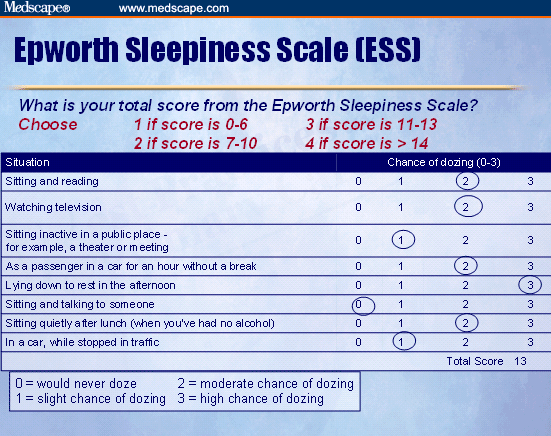Epworth Sleepiness Scale
How to use the epworth sleepiness scale to help diagnosing sleep apnea
 Copyright @medscape.org
Copyright @medscape.orgWith epworth sleepiness scale, the sleep doctor will discover if you have signs of sleep apnea, and he will decide whether you need a sleep study.
In this page you will learn how to test your daytime sleepiness with the epworth scale.
What is the Epworth Sleepiness Scale?
The Epworth scale was developed in 1990 by Dr Murray Johns, the founding Director of the Sleep Disorders Unit at Epworth Hospital, Melbourne, Australia.
Dr Johns invented this test so he could assess the daytime sleepiness of patients in his private practice of Sleep Medicine.
You can also learn about the ESS definition in this video:
Thanks to Dr Murray Johns, you can now have a pretty good idea of how sleepy (not tired) you are during the day, compared with a person without excessive daytime sleepiness.
The Epworth Sleepiness Scale shows you how likely is to fall asleep during the day in different situations, especially when you're not tired. These situations are standard for this test:
|
|
How Do You Score your Sleep Apnea with the Epworth Sleepiness Scale?
The test is simple, and you can test your sleepiness right now. You have to imagine yourself in the eight situations described earlier, selecting your likelihood of dozing in each one.
So, how likely are you to doze off or fall asleep in those situations, in contrast to feeling just tired? This refers to your usual way of life in recent times.
Even if you haven't been in some of these situations recently, try to work out how they would have affected you. Use the following scale to choose the most appropriate number for each situation:
Scoring:
Please add the numbers related to selected situations and check what is the total score. Below you will discover what does your number actually mean?
How to Interpret the Epworth SCORE with Sleep Apnea?
Generally, a total of 10 points or higher is cause for concern. Individual epworth sleepiness scale score of 16 are typically seen only in individuals with narcolepsy, idiopathic hypersomnia, or moderate to severe obstructive sleep apnea.
Also, the less appropriate the circumstances - such as when stopped in traffic while driving or during a conversation - the more dangerously sleepy you are.
Discussing the Epworth SCORE with your Doctor
When you meet with your sleep doctor, he or she will review your questionnaire and sleep diary with you and ask follow-up questions.
To get an accurate picture of what factors may be affecting your sleep, the sleep doctor is likely to ask you about recent changes in your residence, job, marital status, children, pets, and other possible stress-related issues.
Next, the doctor may assess your sleepiness by seeing how you rate on epworth scale. This step is crucial, since people are often bad at judging this phenomenon themselves.
This is often true, because many people are so used to sleep deprivation that they don't realize how tired they are.They may see themselves as unmotivated, lethargic, or lazy, but not sleepy.
In other words, people who have had sleep disorders for all their life may not think it's unusual to fall asleep at a movie or while sitting at a dinner with friends.
Bottom line...
The Epworth Sleepiness Scale has been reported to correlate with the degree of physiologic sleepiness as measured by the multiple sleep latency test if the score is greater than 16.
It is important to appreciate that the presence of excessive daytime sleepiness is neither a necessary nor sufficient condition for OSA: Many patients with AHI greater than 5 do not report daytime sleepiness and many subjects report sleepiness in the absence of sleep apnea.
Home › Sleep Study › Epworth Sleepiness Scale







